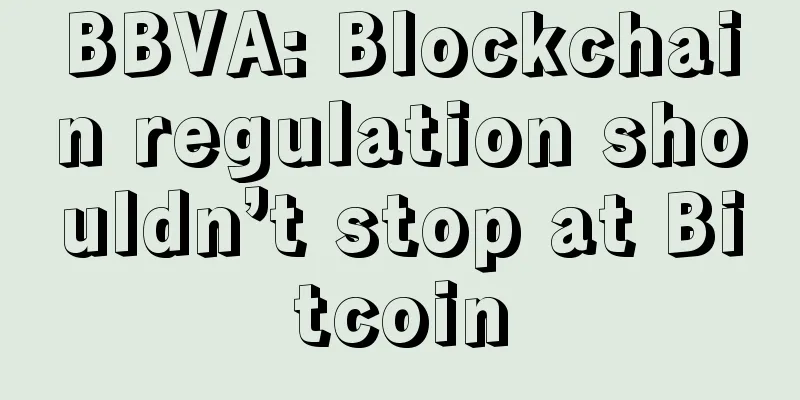BBVA: Blockchain regulation shouldn’t stop at Bitcoin

|
Translator's note: The author of this article, Javier Sebastián, is the Digital Regulation Manager of BBVA. In this article, Sebastián expresses his views on the current regulatory status of the blockchain industry. If we have to pick a trendsetter in the digital banking space, blockchain is the clear winner. Most banks around the world are investigating potential use cases for this secure, distributed database that aims to eliminate intermediaries. Although Bitcoin is the only technology currently available for blockchain, its advantages in improving the efficiency of banking operations are unquestionable. In addition, immutability and transparency are the special properties of blockchain technology itself, and coupled with the automated operation of smart contracts, the two are likely to become the foundation for the development of the entire digital business. However, the popularization of any new technology faces multiple obstacles. Regulation is one of the many factors that affect the popularization of technology. But first of all, we must understand that government regulation does not involve a technology itself, but its derived use cases. The blockchain, which is in the experimental stage, has brought multiple obstacles to the implementation of regulatory policies. Bitcoin is the only real-world use case for blockchain technology, so almost all regulatory discussions focus on it. Take the European Union (EU) for example. The first step of regulation is to coordinate the taxation of transactions. Since some countries define Bitcoin as a digital currency or commodity, the purchase and sale of Bitcoin is subject to value-added tax (VAT). In October 2015, the European Court of Justice (ECJ) officially announced the exemption of VAT on Bitcoin transactions and considered Bitcoin to be a digital currency. The next step is to prevent and combat illegal activities involving Bitcoin, including money laundering and terrorist financing. To achieve this goal, the European Commission (EC) launched a proposal in July last year to include digital wallet providers and virtual currency trading platforms in the Anti-Money Laundering Directive, requiring the recording of user information, aiming to end anonymous Bitcoin transactions. However, other use cases of blockchain are expected to have a disruptive impact in the financial services sector, and their regulatory directives may not be perfected in the short term. However, since all use cases are derivatives of the unique properties of blockchain, unified regulation of blockchain use cases is urgent, and the global and distributed nature of blockchain necessitates the need for a legal framework. Such a legal framework must be universal, including definitions of the legal nature of the technology, applicable regions and laws, and accountability for major failures. Beyond that, the immutability of blockchain has sparked debate on topics such as unfalsifiable, the legal validity of document ownership and authenticity, and the legal enforceability of smart contracts. |
<<: Changing artificial intelligence with blockchain: Decentralization brings a new data paradigm
>>: Qtum Chain Completes the First Smart Contract Platform for Bitcoin UTXO Model
Recommend
What kind of woman's face will be very strong?
Many times, you can tell a woman's fate from ...
Ethereum price reaches all-time high following gas cost reduction and DeFi resurgence
The explosive growth of the past year would not h...
What is the "Chuan" palm? What numerology information does the "Chuan" palm have?
A "川" palm is a palm in which the three...
These facial features indicate that your fortune will change from bad to good.
1. Teeth become neat and white Teeth play a very ...
The shape of the face shows a person's wealth
The shape of the face shows a person's wealth...
Litecoin is gradually being ruined by pyramid schemes
Original title: Woman believed in "Litecoin&...
What are the characteristics of people who frequently change jobs in their careers?
If a job is not going well, then it is normal to ...
Is a woman with a mole in her philtrum lucky? The relationship between a woman's mole in her philtrum and her fortune
The philtrum is a very important acupuncture poin...
Is it good or bad for a man to have a mole on his ear? How to understand a man's mole
There are people who have moles on their ears. Mo...
How healthy are you by your hair
From the perspective of physiognomy, a person'...
Detailed explanation of what the hanging needle pattern on the forehead indicates
Yin Tang: Also known as the Palace of Life. The l...
Is it good for a woman to have Sichuan lines?
The lines on everyone's palm are different. S...
What is Danfeng Eye?
Danfeng Eyes, What Are Danfeng Eyes? People with ...
Palmistry for never giving up on love
Palmistry for never giving up on love In love, no...
Changpeng Zhao: I believe DEX can replace CEX
CZ was recently a guest on CNA's In Conversat...









